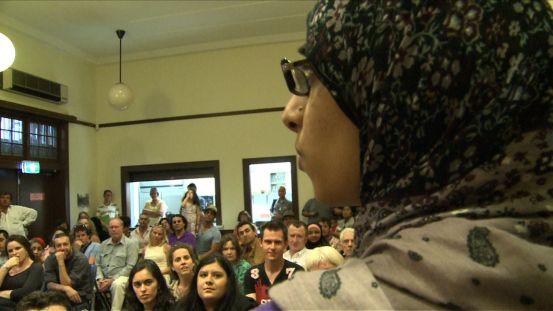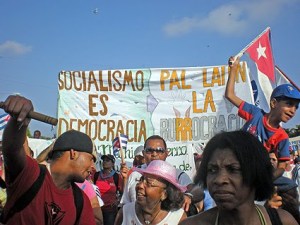Why calls for a ban on the wearing of the burqa help the racists
Pip Hinman addresses the meeting on November 24, 2010.
By Pip Hinman
Australia: A community says no to racist burqa bans

By Peter Boyle, Sydney
November 26, 2010 -- All around the Western world, far-right groups (some with neo-Nazi orgins and links) are gaining political ground through an orchestrated campaign against Muslim communities. By spreading fear and hatred against recent immigrant communities from Muslim countries these groups have tapped into well-resourced post-9/11 war propaganda campaigns initiated by rulers of the world’s richest and most powerful states.
One of the favourite tactics of these anti-Muslim hate campaigners is to push laws banning the burqa, the fully veiled dress style used by a tiny minority of Muslim women. In Australia, the ultra-conservative Reverend Fred Nile, leader of the Christian Democratic Party and a member of the NSW Legislative Council, and Liberal senator Cori Bernardi from South Australia, have unsuccessfully tried to move private member's bills to ban the burqa.
Battlelines drawn for Cancun climate summit: `Nature has no price!'

Protesters in Newcastle,Australia, December 20, 2009. Photo by Rising Tide.
By Simon Butler
November 22, 2010 -- Green Left Weekly -- If at first you don’t succeed, redefine success. This phrase has become the unofficial motto of this year’s United Nations climate conference in Cancun, Mexico. Just out from Cancun, which runs over November 29 to December 10, there is little hope of meaningful progress. Yet key players have sought to throw a shroud of official optimism over the looming failure.
Few Western politicians want a repeat of last year’s Copenhagen climate conference. They consider it a public relations disaster.
In the lead-up to Copenhagen, public expectations were high. There was a widespread feeling that politicians could no longer ignore the warnings from climate scientists. Many politicians said they agreed strong, decisive action to curb emissions was needed.
But when the big polluting countries blocked a new legally binding treaty at Copenhagen, they were badly exposed.
The left cannot ignore China’s achievements, but neither can it be too celebratory

Rural poverty in China is much higher than urban poverty.
By Michael Karadjis

November 23, 2010 -- Irish Republican News -- The public finances of the 26-county state [Ireland] will, for the next three years at least, be subject to “regular reviews” by external monitors working on behalf of the International Monetary Fund (IMF), the European Union (EU) and the British and Swedish governments.
On November 21, the Taoiseach [Prime Minister] Brian Cowen and minister for finance Brian Lenihan, after a week of shocking lies and deceit, said they were accepting the IMF/EU bailout. It later emerged that the G7, comprising the seven most powerful countries in the world, had met to give its approval to the deal.
`Leave the oil in the soil!' -- Oil curses, climate conferences and fake Norwegian ‘Good Samaritans’

A humpback whale at the Bluff Whaling Station, South Durban, in 1909. From "Facts About Durban".
By Patrick Bond
November 23, 2010 -- Links International Journal of Socialist Renewal -- The stench of rotting blubber would hang for days over The Bluff in South Durban, South Africa, thanks to Norwegian immigrants whose harpooning skills helped stock the town with cooking fat, margarine and soap, starting about a century ago. The fumes became unbearable, and a local uproar soon compelled the Norwegians to move the whale processing factory from within Africa’s largest port to a less-populated site a few kilometres southeast.
There, on The Bluff’s glorious Indian Ocean beachfront, the white working-class residents of Marine Drive (perhaps including those in the apartment where I now live) also complained bitterly about the odour from flensing, whereby blubber, meat and bone were separated at the world’s largest onshore whaling station.
`Foro Social Latinamericano', Green Left Weekly's Spanish-language supplement, November 2010 issue
The tide of rebellion and revolution now sweeping Latin America is posing a serious challenge to imperialism’s brutal global rule. For anyone who wants an end to war, exploitation and oppression, Latin America’s struggles to create alternatives are crucially important.
Australia's leading socialist newspaper Green Left Weekly is strongly committed to supporting the growing “people’s power” movement in Latin America. We are proud of the fact that GLW is the only Australian newspaper to have a permanent bureau in Latin America, based in Caracas, Venezuela. Through our weekly articles on developments in the region, GLW strives to counter the corporate media’s many lies about Latin America’s revolutions, and to give a voice in English to the people’s movements for change.
Cubans discuss economic changes: `It is the people who will decide'

[For more analysis and discussion on the economic changes in Cuba, click HERE.]
November 19, 2010 -- Granma -- The 6th congress of the Communist Party of Cuba will take place in April 2011 and the only topic of discussion will be the analysis of the country's economic and social model. Prior to the congress, from December 2010 through February 2011, a process of popular debate will unfold based on a fundamental party document entitled "The Economic and Social Policy Development Project", which is already in the hands of the people, a sampling of whose opinions Granma offers.
`This is genuine socialist democracy'
France: Movement debates next steps in resistance to government attacks
By Chris Latham
November 14, 2010 -- Green Left Weekly -- President Nicolas Sarkozy enacted a new law on November 10 that increases the retirement age of French workers. The move came just days after more than a million workers and students mobilised across France against the law.
The November 6 protests were the eighth national strike and protests since September 7 against the bill — although it was the easily the smallest of the mobilisations.
The protest highlighted the depth of ongoing popular anger over the changes, which were pushed through parliament on October 27. However, the decline in the size of the protests reflects growing divisions in the movement over its direction now the law has been passed.
Sarkozy enacted the law just hours after it had been approved by the Constitutional Council. There had been hopes among some union leaders and left groups that the council would reject the bill.
Thailand: Red Shirts flood centre of Bangkok again

Ratchaprasong is a sea of Red Shirts again. Photos by Khun Kamberg CBN Press.
[Read more articles about Thailand HERE.]
By Peter Boyle, photos by CBN Press
November 19, 2010 – Thousands of supporters of the Thailand’s Red Shirt (the popular name for supporters of the United Front for Democracy Against Dictatorship) movement once again turned Bangkok’s busy Ratchaprasong Intersection into a sea of red.They turned out in their thousands (see video of the crowd posted by Richard Barrow to Twitter here) to mark six months since the Thai military bloodily attacked and dispersed a mass protest camp that occupied the area in April and May this year. More than 90 people were killed, thousands injured and hundreds or protesters are still imprisoned.
Haiti: Sham `selection' serves interests of wealthy elite and foreign powers
By the Canada Haiti Action Network
November 12, 2010 -- The Canada Haiti Action Network (CHAN) is once again expressing its grave concerns about exclusionary elections in Haiti.[1] It joins with the many Haitians as well as human rights organisations in Haiti and abroad in condemning these elections as serving the interests of Haiti's wealthy elite and the foreign powers that have dominated Haiti's past and present.
